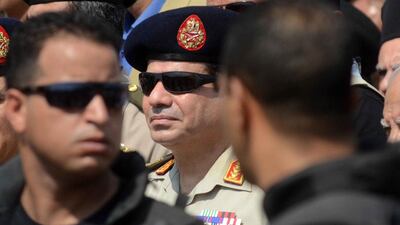The formation of Egypt’s new government, with Field Marshal Abdel Fattah El Sisi retained as defence minister, has raised speculation about why the army chief is waiting to announce his candidacy for president.
With elections due by the end of next month, his main rival, the leftist politician Hamdeen Sabahi, has already declared his candidacy and many thought with Field Marshal El Sisi shuffled out of the cabinet, he’d be free to announce his own run.
Military officials close to Field Marshal El Sisi say they are baffled by the media’s seeming obsession about the issue. While speaking about it as a foregone conclusion, they say the field marshal will not announce his candidacy until an election law currently being vetted by senior judges is ratified.
He will only do so, they say, when the election commission formally opens the door for hopefuls to register their candidacy, something that may not happen before the middle of this month or later since the draft law gives candidates only three weeks to campaign.
The officials, meanwhile, say Field Marshal El Sisi is spending his days talking with experts on the nation’s crucial issues — such as the economy and security — and assembling a team of veteran politicians and advisers to help run his campaign.
The campaign will not be an ordinary one, the officials said. The usual meet and greets with voters and rallies held in marquees will be few and far between because of fears for his life.
Instead, they said, the campaign is likely to be dominated by selective TV appearances.
While last week’s surprise resignation of the cabinet did not catapult Field Marshal El Sisi into civilian life as many has expected, the move was related to his presidential aspirations, although indirectly.
There had been growing discontent with the previous prime minister Hazem El Beblawi’s cabinet that struggled from a range of problems, from a slump in tourism and productivity to surging crime and militancy to high unemployment.
Officials close to the military say Field Marshal El Sisi could not afford to allow the country to slip into unrest in the days and weeks ahead of elections, fearing that such conditions would reflect negatively on his image.
But the move may prove inadequate to appease the street at a time when Egypt’s troubles are many.
Mr El Beblawi, a career economist, bowed out at a time when rubbish collectors in Cairo’s twin city of Giza were on strike along with the city’s public transport workers. There was also a partial strike by doctors and a shortage of fuel that was getting more and more acute in provincial areas.
White-collar government employees were also staging protests outside the cabinet office in downtown Cairo last week to demand better pay; and the country’s textile workers in the industrial city of Mehalla in the Nile Delta were on strike for 11 days last month.
Meanwhile, the new prime minister, Ibrahim Mehlib, a former housing minister and construction magnet, was a senior member of the former dictator Hosni Mubarak’s now-dissolved National Democratic Party, a fact that triggered a flurry of criticism on social media by liberal and secular revolutionaries.
Adding pressure to the interim government, universities and schools are to open next week after a longer-than-usual midyear break, giving protesters supporting the former Islamist president Mohammed Morsi, who was removed from power by Field Marshal El Sisi, back the stage they had taken advantage of on an almost daily basis since September to stage demonstrations and maintain a level of tension on the streets.
There have been very few demonstrations by the pro-Morsi camp since the midyear break, giving authorities a much-needed reprieve to reconsider tactics to contain these protests.
A new development that could add fuel to the fire at universities is a court ruling issued last week that restores the presence of police on campus three years after their removal.
The move was a throwback to the Mubarak days when police were known for meddling in the affairs of colleges and targeting student activists.
The government said the move was to keep campuses peaceful.
foreign.desk@thenational.ae

